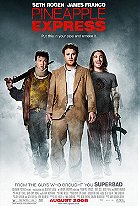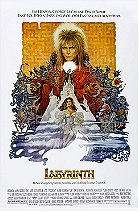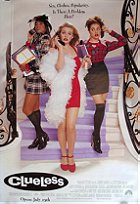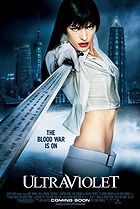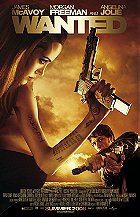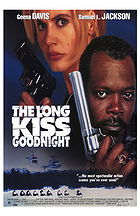James Bond: "Yes, but my martini is still dry. My name is James."
Never Say Never Again is the third "unofficial" entry in the James Bond film series. By using the term "unofficial", I refer to the fact that they weren't produced by the Broccoli family or EON productions, nor were they theatrically distributed by MGM/United Artists. Prior to this 1983 film, two other "unofficial" entries were produced - two renderings of Casino Royale (an early 1954 television production, and silly comic parody released in 1967).
The story behind Never Say Never Again is a fascinating tale. This film is essentially a reworking of Thunderball, featuring the one and only Sean Connery reprising the illustrious role for the first time since 1971's Diamonds Are Forever.
Back in the 1950s, screenwriter Kevin McClory collaborated with original Bond author Ian Fleming to adapt a Bond novel to the big screen. Eventually the two decided to instead compose a wholly original script. However, financing fell through and the project was abandoned. Unbeknownst to McClory, Fleming seized the ideas enclosed in their script and wrote the novel Thunderball. A furious legal battle ensued as McClory desired his share of the credit (which is why he's billed alongside Fleming in all current printings of the novel). From there, the rights to the novel were owned by McClory. He sold the film rights to Bond producers Albert R. Broccoli and Harry Saltzman. In return he asked for 20% of the film's box office profits, a producer's billing and the option to remake Thunderball ten years following the initial release. Ten years passed, and McClory wanted to green light his remake. Legal battles consequently burdened the project, as well as the studio's disinclination to fund it. Finally, the film was resurrected when McClory persuaded former Bond star Sean Connery to reprise the role.
Never Say Never Again was released in 1983, up against Roger Moore as Bond in Octopussy. It boiled down to a competition between the die-hard Connery fans and the mainstream audience that preferred Moore portraying the character. The rest is history...Never Say Never Again earned meagre profits while Octopussy proved triumphant and came out on top. It's obvious why Moore's Bond film proved more lucrative: Octopussy flaunted better stunts, a bigger concept, superior actors, and far more excitement.
The plotline of Never Say Never Again is wafer thin and frequently very pretentious. Basically, the idea of nuclear missiles being hijacked (as seen in 1965's Thunderball) is retained. Secret Agent James Bond 007 (Connery) becomes entangled in a SPECTRE plot to kidnap warheads and threaten key cities. SPECTRE basically holds the world hostage with plans to extort money from world leaders. The film's story creates a tediously overlong and disjointed 007 adventure. Things become dragged out to excess, with a shocking shortage on action and typical Bond moments. Not to mention the dreadfully formulaic structure in place. The script moves from one stupid situation to the next. Some of the worst Bond scenes in cinematic history are instigated here, for example Bond playing a video game with villain Largo (Brandauer). Credit must go to the screenwriter for developing some sophisticated dialogue though. There are a few typical charming Bond moments, one-liners and an assortment of impressive action. What's missing are the clever scenarios and the fast pace.
Director Kershner isn't capable of keeping the proceedings taut and exciting. Things quickly become boring, in addition to becoming difficult to follow. You'll be none the wiser about the meaning of the events until you watch the film a second time. It also must be noted that it's impossible to stop thinking about the original Bond adventures and how vastly superior they are in every aspect.
Sean Connery's reprisal of the role is what generated much of the film's marketing hype. The producers figured that audiences would love to see their traditional Bond return to action as opposed to Roger Moore. Many criticised Connery's performance due to his age, whereas Roger Moore is two years older than Connery and he was portraying the character until several years later! Here, Connery is 53 and still oozing his boyish charm. Kim Basinger is an average love interest. Still in her early acting days, she still needed a few more lessons. Klaus Maria Brandauer is an extremely weak and underwhelming villain. He isn't memorable, nor is he sinister or evil. It's very difficult to determine that he is the villain until halfway through the running time! Max von Sydow also appears as trademark Bond villain Blofeld. Rowan Atkinson, in his first screen performance, is the light comic relief. He has a minor role, but considering his current fame it's easy to notice him. (Atkinson later featured in a spoof of the Bond movies, entitled Johnny English)
Overall, Never Say Never Again is a disappointing reworking of a classic Bond adventure. While the dialogue is occasionally sophisticated, everything else is very below par. It's undeniable that the action scenes are sometimes highly entertaining, but the climax is overlong and sapped of any excitement. The underwater battles are far superior in Thunderball. The classic characters are present without the familiar face attached. "M" is no longer stern and authoritative, while "Q" is now a very Cockney character. At times the film is very entertaining of course, and the title song is really catchy. Additionally, the filmmakers could not afford the trademark Bond theme...and this theme is sorely missed. As a result, the action is less exciting. Bond adventures never succeed without the trademark theme. Consequently, Bond fans can afford to give it a miss. It's interesting to note that the film's title references Sean Connery's stance to "never again" play the character of James Bond.
5.9/10
 Login
Login
 Home
Home 183 Lists
183 Lists 1665 Reviews
1665 Reviews Collections
Collections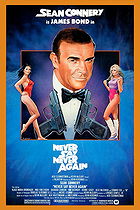
 0 comments,
0 comments, 